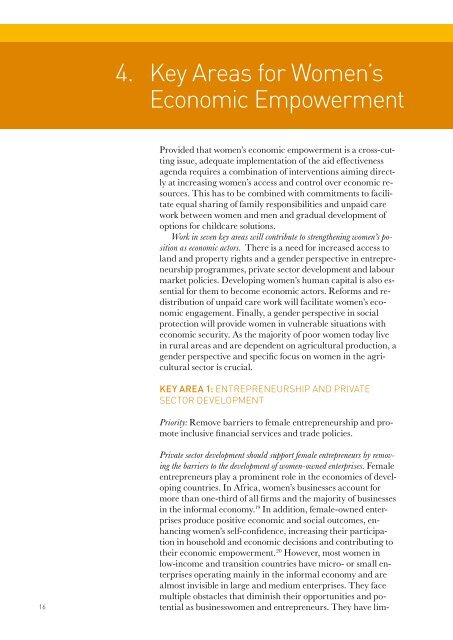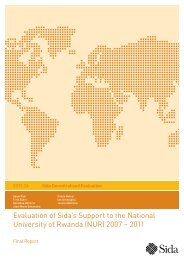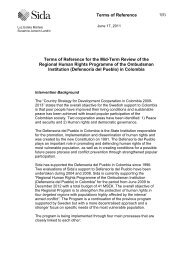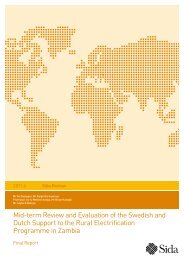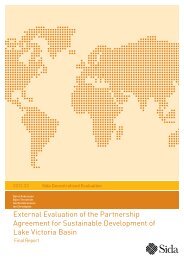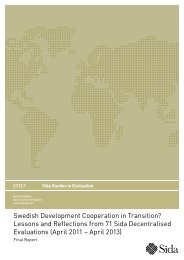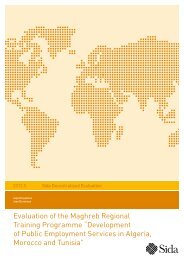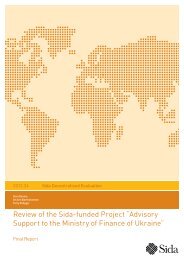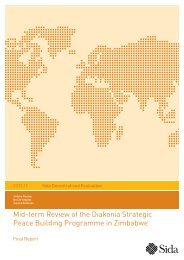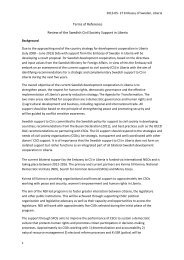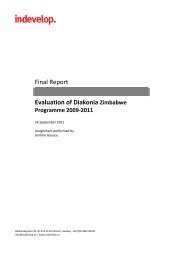4. Key Areas <strong>for</strong> Women’s<strong>Economic</strong> <strong>Empowerment</strong>Provided that women’s economic empowerment is a cross-cuttingissue, adequate implementation of the aid effectivenessagenda requires a combination of interventions aiming directlyat increasing women’s access and control over economic resources.This has to be combined with commitments to facilitateequal sharing of family responsibilities and unpaid carework between women and men and gradual development ofoptions <strong>for</strong> childcare solutions.Work in seven key areas will contribute to strengthening women’s positionas economic actors. There is a need <strong>for</strong> increased access toland and property rights and a gender perspective in entrepreneurshipprogrammes, private sector development and labourmarket policies. Developing women’s human capital is also essential<strong>for</strong> them to become economic actors. Re<strong>for</strong>ms and redistributionof unpaid care work will facilitate women’s economicengagement. Finally, a gender perspective in socialprotection will provide women in vulnerable situations witheconomic security. As the majority of poor women today livein rural areas and are dependent on agricultural production, agender perspective and specific focus on women in the agriculturalsector is crucial.Key area 1: Entrepreneurship and privatesector developmentPriority: Remove barriers to female entrepreneurship and promoteinclusive financial services and trade policies.16Private sector development should support female entrepreneurs by removingthe barriers to the development of women-owned enterprises. Femaleentrepreneurs play a prominent role in the economies of developingcountries. In Africa, women’s businesses account <strong>for</strong>more than one-third of all firms and the majority of businessesin the in<strong>for</strong>mal economy. 19 In addition, female-owned enterprisesproduce positive economic and social outcomes, enhancingwomen’s self-confidence, increasing their participationin household and economic decisions and contributing totheir economic empowerment. 20 However, most women inlow-income and transition countries have micro- or small enterprisesoperating mainly in the in<strong>for</strong>mal economy and arealmost invisible in large and medium enterprises. They facemultiple obstacles that diminish their opportunities and potentialas businesswomen and entrepreneurs. They have lim-
KEY AREAS FOR WOMEN’S ECONOMIC EMPOWERMENTited access to education and training, are less likely to bemembers of business associations, have less freedom to selecttheir business sector, and are subject to discriminatory attitudesin property, marital and inheritance laws. 21 Many relyon personal savings or on contributions from relatives to fundtheir enterprises, and without property ownership, they lackcollateral to access credit from <strong>for</strong>mal financial institutions. 22They also face administrative barriers as well as lack of in<strong>for</strong>mation,which limit business development and hinder graduationfrom the in<strong>for</strong>mal to the <strong>for</strong>mal economy.Enabling women to become successful in business development requiresaddressing underlying policy and regulatory constraints. The hurdlesfaced by women and men when starting or expandingtheir business vary from country to country, sector to sectorand region to region. It is there<strong>for</strong>e important to develop theknowledge base about local entrepreneurship and its characteristics,including the challenges confronting each group indifferent settings. Thereby women’s and men’s equal access toeconomic resources and business support to start, <strong>for</strong>malizeand expand their businesses can be ensured. (See Box 3)In order to be successful, sector policies need to continue supportingbusiness training, start-up services and mentorship <strong>for</strong> women linked tomicro-finance while promoting measures that set the foundations <strong>for</strong> amore business-enabling environment and inclusive financial systems.Many programmes exist throughout the developing worldthat offer small-scale entrepreneurship training <strong>for</strong> women,provide market in<strong>for</strong>mation, promote market access through,<strong>for</strong> example, trade fairs, and improve business managementand financial skills. Services through business incubators areincreasingly offered to young people, men and women, and afew are offered exclusively to women and girls. It should benoted that training programmes designed to suit the needs ofwomen do exist as well as programmes that set criteria ensuringthat at least a certain percentage of participants are women.These are examples of initiatives which can be furtherdeveloped.Access to non-collateralized credit is important <strong>for</strong> starting or growingbusinesses. In many places, micro-credit is accessible to womenbut such schemes do not always address the issue of the sizeand duration of loans women may need. Even when loans areaccessible, they are often too small to provide sufficient capitalto start or grow an enterprise. Measures to address these issuesinclude investing in product development that responds to theneed <strong>for</strong> larger loans and longer terms in micro-credit programmesand setting up equity lines as incentives <strong>for</strong> commercialbanks to lend to women. Where programmes do not currentlyexist, start-up investments in micro-finance can beeffective, as the knowledge and systems are now well knownand easily replicable.17


